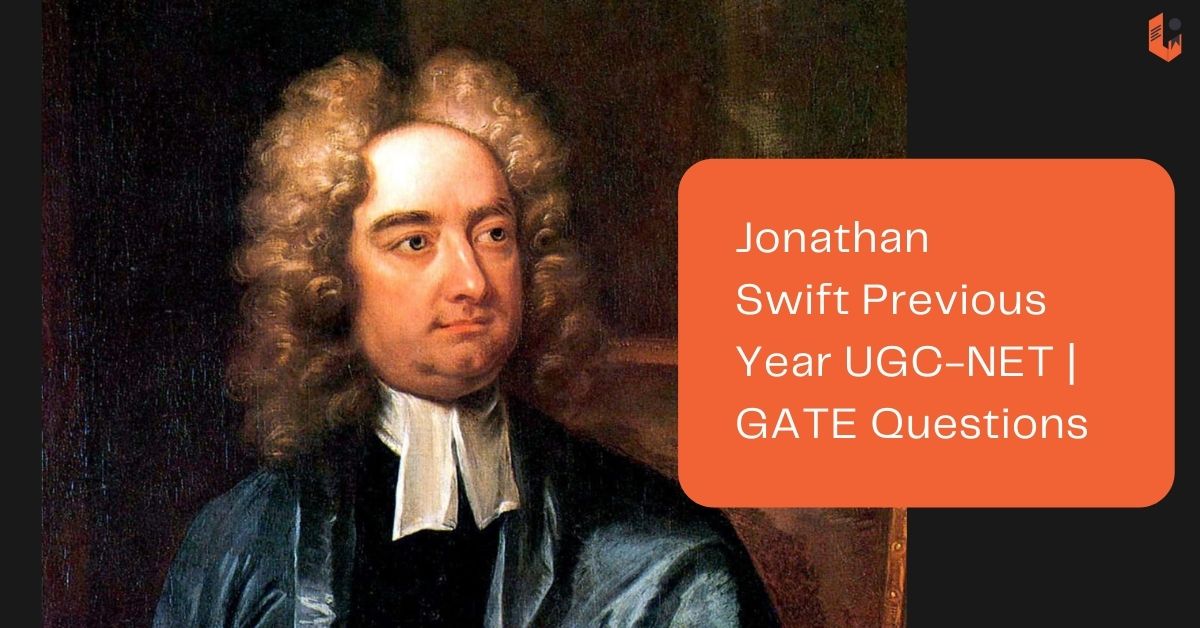UPDATE: Now, you can get these 4000+ questions in booklet/hardcopy format. Click here to know more.
Jonathan Swift – Previous Year UGC-NET English
1. In 1722 the Crown awarded a certain English merchant a patent to manufacture copper coins for Ireland. Jonathan Swift intervened by way of composing a series of letters in response, better known as The Drapier’s Letters. Who was the merchant?
2. By what name is Gulliver known in Brobdingnag?
3. In Jonathan Swift’s Gulliver’s Travels Gulliver refers to William Dampier, the famous writer of two voyages, as:
4. Gulliver receives the following response when he boasts about his countrymen:
“….the most pernicious race of little odious vermin that nature ever suffered to crawl upon the face of the earth.”
Whose response?
5. After his return from the land of Houyhnhnms, Gulliver refused to let his wife and children __________ .
6. Which of the following books by Jonathan Swift is a religious allegory?
7. Why do the Houyhnhnms have so few words in their language?
8. At the conclusion of Swift’s Modest Proposal, the narrator declares that he has “not the least personal interest in endeavouring to promote this necessary work, having no other motive than the public good of my country.” What evidence does the narrator give that his advice is free from other motives?
I. The narrator is Irish and a sworn bachelor, unlikely to father children.
II. He has no children who will be affected by the scheme, and thus cannot make money from it.
III. His wife is past childbearing, and thus the narrator cannot benefit by “breeding” her.
IV. The narrator is English, and therefore this scheme will not affect him personally.
The right combination according to the code is:
9. At the conclusion of Gulliver’s Travels, Gulliver argues that his motivation for telling the tale is:
10. From which source did Swift get the idea of writing “Verses on the Death of Dr. Swift”?
11. Tale of a Tub is about:
12. Swift’s Modest proposal is written in the form of a:
13. In which of his voyages, Gulliver discovered mountain-like beings?
14. Read the following statement and the reason given for it. Choose the right response.
Assertion (A): Gulliver’s Travels earned Jonathan Swift the bad name of being a misanthrope.
Reason (R): Swift in the novel was neutral to the image of man.
Reason (R): Swift in the novel was neutral to the image of man.
15. Identify the work below that does not belong to the literature of the eighteenth century:
16. The period of Queen Victoria’s reign is:
17. The predominant tone and thrust of Jonathan Swift’s “A Modest Proposal” are:
18. The last of Gulliver’s Travels is to:
19. In the late seventeenth century a “Battle of Books” erupted between which two groups?
20. In Gulliver’s Travels Struldbruggs are ……………
21. In Gulliver’s Travels which of the following ideas is not a product of the Academy of Lagado?
22. Jonathan Swift arrived in London in 1710 and confronted a rapidly changing world in the new Tory ministry. His reactions to this world are vividly recorded in his journal to Stella, a series of letters addressed to:
(a) Hester Vanhomrigh
(b) Esther Johnson
(c) Rebecca Dingley
(d) Lady Mary Montagu
The right combination according to the code is:
23. Match List I and List II:
List I (Essayist):
A. George Orwell
B. Michel de Montaigne
C. Charles Lamb
D. Jonathan Swift
List II (Essay):
I. “On the Artificial Comedy of the Last Century”
II. “Why I Write”
III. “A Modest Proposal”
IV. “On the Cannibals”


Thank you very much…sir